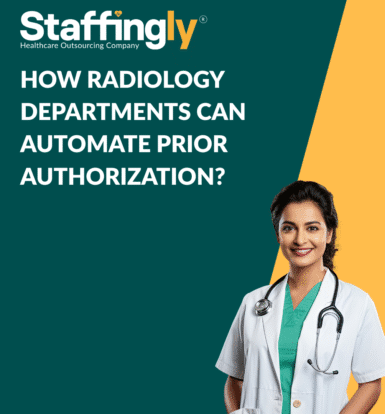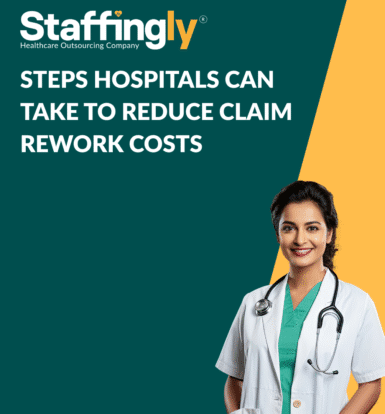On-Demand Outsourcing BPO Services for Healthcare Providers With 24/7 Coverage!
Save up to 70% on staffing costs!
Browse Specialty Staffing Services
How Radiology Departments Can Automate Prior Authorization?
Prior authorization (PA) is a persistent challenge for radiology departments. It often causes delays in patient care, increases administrative workloads, and contributes to financial inefficiencies. The manual processes currently in place are outdated, time-consuming, and unsustainable especially as imaging volumes rise and payer requirements become more complex. Automating prior authorization offers a strategic path forward. With the right systems and workflows, radiology departments can streamline approvals, reduce denials, and improve the overall patient experience. This article outlines how to achieve

Is My Virtual Medical Assistant HIPAA Compliant? Checklist and Guide
There was a time when healthcare practices could operate with minimal digital oversight. That time is gone. Today, with virtual medical assistants handling sensitive patient data remotely, HIPAA compliance has become one of the biggest liability risks—and most practices don’t even know they’re exposed. “We hired a virtual assistant and never thought about HIPAA until our lawyer mentioned it during an audit.” For practices looking to streamline operations, virtual assistants feel like the perfect solution. But without proper HIPAA compliance,

Reduce Healthcare Costs: Insurance Verification Outsourcing Benefits
Every healthcare practice faces the same challenge: patients walking through the door without knowing if their insurance will cover the visit. What seems like a simple verification process has become one of healthcare’s most expensive administrative burdens. Insurance verification isn’t just about checking coverage—it’s about preventing claim denials, reducing patient collections headaches, and maintaining cash flow. Yet most clinics treat it as an afterthought, assigning it to already overwhelmed front desk staff who juggle phones, appointments, and patient check-ins simultaneously.

Why Do Outpatient Departments Often Lag in Revenue Cycle Efficiency?
In the evolving landscape of healthcare, outpatient departments (OPDs) have become crucial access points for patient care. From routine check-ups to specialized procedures, OPDs manage a high volume of patient interactions. However, despite their growing importance, many outpatient departments face significant challenges in maintaining efficient revenue cycle management (RCM). This inefficiency often leads to delayed payments, increased denials, and financial strain on healthcare providers. In this article, we explore the key reasons why outpatient departments often lag in revenue cycle

Why Do Many Hospitals Struggle with Creating Accurate Patient Estimates?
In the era of increasing healthcare transparency and rising consumer expectations, hospitals are under pressure to provide accurate and timely cost estimates to patients before treatment. Yet despite technological advancements and policy mandates like the No Surprises Act and price transparency rules from the Centers for Medicare & Medicaid Services (CMS), many hospitals continue to struggle with creating accurate patient estimates. This article explores the core challenges behind this issue and why even well-resourced health systems find it difficult to

Steps Hospitals Can Take to Reduce Claim Rework Costs
Claim rework is a costly, time-consuming process that burdens hospital resources, delays revenue, and hampers patient satisfaction. When claims are denied, rejected, or returned due to inaccuracies or missing information, hospitals must invest additional time and labor to correct and resubmit them. This not only impacts cash flow but also drains operational efficiency. Fortunately, there are several strategic steps hospitals can take to reduce claim rework costs significantly. 1. Strengthen Front-End Processes The root cause of most claim rework lies

How Hospitals Can Optimize Patient Registration to Prevent Revenue Delays?
Efficient patient registration is a critical cornerstone of hospital revenue cycle management. Inaccuracies or inefficiencies in the registration process can lead to claim denials, delayed reimbursements, and ultimately, revenue loss. Optimizing patient registration not only ensures a smooth administrative workflow but also enhances patient experience and financial outcomes. This article explores best practices, technologies, and strategies hospitals can adopt to optimize patient registration and minimize revenue delays. 1. Understanding the Impact of Registration on Revenue The patient registration process is

Doctors Experiencing Claim Rejections from Missing Documentation: Causes, Consequences, and Solutions
In the increasingly complex landscape of healthcare reimbursement, doctors and medical practices face numerous administrative hurdles. One of the most significant challenges is dealing with claim rejections due to missing documentation. These rejections not only delay payments but can also impact cash flow, practice operations, and ultimately patient care. Why Are Claims Rejected Due to Missing Documentation? Medical claims submitted to insurance companies require comprehensive documentation to support the services billed. This documentation typically includes: Patient history and clinical notes
 Book a Demo to Build Your Team Today!
Book a Demo to Build Your Team Today!


 Read Case Studies
Read Case Studies 



 Virtual Medical Assistants
Virtual Medical Assistants



